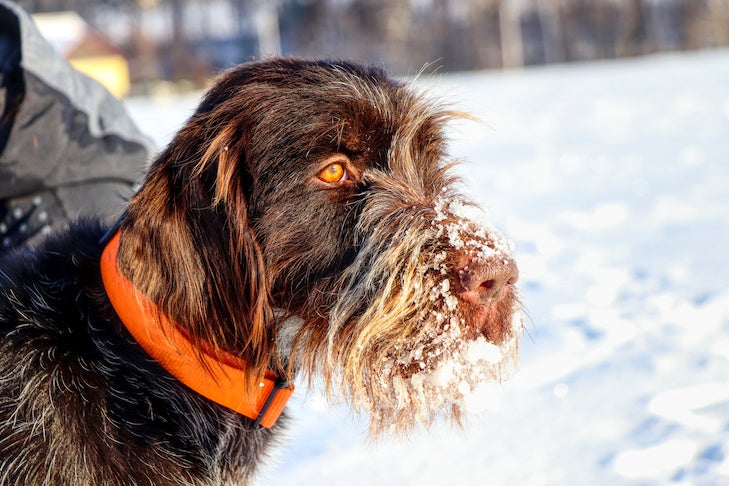
Rarely life-threatening but always irritating, the common cold is just a fact of life for humans. But can dogs get colds?
Dogs can get infections that make them sneeze and sniffle, just like we do. However, your dog’s cold symptoms could also be the result of a more serious disease.
What Is a Cold?
When people talk about catching a cold, they are actually referring to a wide range of viruses. All of these viruses are grouped together as cold viruses because they cause similar symptoms, such as sneezing, sore throat, runny eyes and nose, and general malaise. In people, the most common viral cold agents are the rhinovirus, which is estimated by WebMD to cause more than 50% of colds in humans, and also the corona, respiratory syncytial virus, influenza, and parainfluenza viruses.
The causes of colds in dogs are similar. There is not one specific virus that gets the label “cold virus.” Instead, several different viruses can cause cold symptoms in dogs. Some of these are more serious than others, which is why it is important to treat your dog’s cold symptoms with a little more gravity than you might treat a human cold.
What Are the Symptoms of Colds in Dogs?
You may recognize some of your own cold symptoms in the symptoms of colds in dogs.
Common symptoms of colds in dogs include:
- Sneezing.
- Coughing.
- Runny or congested nose.
- Watery eyes.
These symptoms could be the result of a dog cold virus, but they could also be symptoms of more serious conditions like kennel cough, influenza virus (dog flu), the parainfluenza virus, bronchitis, or even canine distemper.
If your dog is experiencing these symptoms, your safest option is to call your veterinarian for advice. If your dog is also experiencing a change in appetite, fever, vomiting, diarrhea, or any other changes in normal behavior, they could be suffering from a more serious disease that requires veterinary treatment.

Cold or Kennel Cough?
Kennel cough (also known as canine infectious tracheobronchitis) is a highly infectious respiratory disease in dogs. It gets its name from its most common place of transmission — kennels. At kennels and other places where large numbers of dogs congregate, it is easy for dogs to catch and transmit viruses. Kennel cough is treatable, and most dogs recover, but it can have more serious consequences in puppies and dogs with compromised immune systems.
The most distinctive characteristic of kennel cough is the dry, honking cough that dogs develop. Some people equate it to the sound of a honking goose. Other symptoms of kennel cough include sneezing, a runny nose, lethargy, appetite loss, and a low fever. Since many of these symptoms can also be found in dogs with colds, it is important always to consult your veterinarian.
Are There Other Causes of Cold Symptoms?
Viruses aren’t the only things that cause cold symptoms such as coughing, sneezing, or runny eyes and nose. Coughing could also be the result of bacterial or parasitic infections such as heartworms and roundworms. Fungal infections and allergies can also cause cold-like symptoms and can lead to damage to lung tissue and possibly pneumonia.
How Are Dog Colds Treated?
If you suspect your dog has a cold, the first thing you should do is call your veterinarian. While a mild cold is probably not a cause for concern, it is very important to rule out any other causes of your dog’s symptoms.
Your veterinarian will perform a physical exam of your dog to listen to their heart and lungs and may suggest running a series of diagnostic tests to make sure your dog does not have a more serious condition. Radiographs, fecal analysis, and bloodwork can help isolate the cause of your dog’s cold symptoms and lead to the best treatment plan.
Treatment for your dog’s cold will depend on the underlying cause. Mild colds typically resolve on their own. But if your dog’s cold turns out to be an infection such as kennel cough, for example, your veterinarian will recommend a treatment protocol that could include rest, antibiotics for secondary infections, cough suppressants, and fluids, especially if your dog is a puppy or immuno-compromised.

Can Dogs Get Colds from Humans?
The chances of dogs contracting a cold from humans are extremely low. The viruses that cause cold-like symptoms in humans and dogs rarely jump from one species to the other, so you can rest easy about giving your dog your case of the sniffles.
Likewise, you probably won’t catch a cold from your dog. But other dogs in the household or neighborhood could be at risk of contracting whatever virus is causing your dog’s cold. So play it safe and keep your dog away from other dogs until they are feeling better.
Can You Prevent Your Dog from Getting a Cold?
Sadly, there is no vaccine for the common dog cold, just like there is no vaccine for human colds, thanks to the sheer number of viruses that can cause cold symptoms.
Some causes of cold-like symptoms, however, do have vaccines. The vaccines for kennel cough, distemper, and canine influenza viruses can help reduce your dog’s risk of contracting these diseases. Veterinarians generally recommend that all dogs be vaccinated for distemper. Talk to your veterinarian about whether or not they recommend any other vaccines to keep your dog healthy.
As a dog owner, you can also keep your eyes and ears open for mentions of outbreaks of canine diseases in your community. During those times, avoid taking your dog to places where other dogs congregate.
This article is intended solely as general guidance, and does not constitute health or other professional advice. Individual situations and applicable laws vary by jurisdiction, and you are encouraged to obtain appropriate advice from qualified professionals in the applicable jurisdictions. We make no representations or warranties concerning any course of action taken by any person following or otherwise using the information offered or provided in this article, including any such information associated with and provided in connection with third-party products, and we will not be liable for any direct, indirect, consequential, special, exemplary or other damages that may result, including but not limited to economic loss, injury, illness or death.

